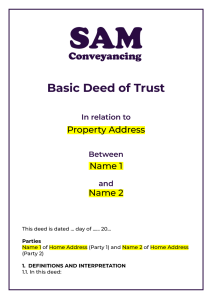Joint Ownership of Property
Buying a home with someone else (such as a partner) is a big step, but how you legally own it is just as important as the purchase itself.
In England & Wales, you have two choices: Joint Tenants or Tenants in Common. This decision dictates everything from what happens if one of you dies to how you can sell or pass on your share.
Legal vs Beneficial Ownership
When you own a property jointly, it is important to understand the difference between legal ownership and beneficial ownership.
Legal Ownership refers to the name on the title deeds. This is who is officially registered as the owner at the Land Registry and who is legally responsible for the property. A maximum of four people can be legal owners.
Beneficial Ownership refers to who has a right to the equity in the property. This determines who gets what share of the sale proceeds. The legal owners hold the property on trust for the beneficial owners.
- Severance of Joint Tenancy and registration at the Land Registry.
- Fixed fees starting from £260 INC VAT.
- You will need to upload your Notice of Severance.
- Contact us for a fixed-fee, no-obligation quote.

Joint Tenants vs Tenants in Commons
When you co-own a property in England & Wales, you must choose between two types of ownership: Joint Tenants or Tenants in Common.
The choice affects what happens to your share of the property if your relationship changes or an owner dies.
- Joint Tenants own the property as a single entity with no individual shares. This means if one person dies, their share automatically passes to the remaining owner through the right of survivorship.
- Tenants in Common own a specific, separate share of the property. This means you can leave your share to a beneficiary in your will.
If your circumstances change and you need to alter your ownership structure, you can learn how to change from joint tenants to tenants in common (and vice-versa) or even how to sever a joint tenancy.
How to find out if you are Joint Tenants or Tenants in Common
To find out how a property is owned, you can download the Title Register from HM Land Registry. This document is the definitive record of a property's ownership.
You are a tenant in common if a Form A restriction has been placed on the register. This restriction is a clear indicator that the property is held in separate shares.
If a Form A restriction is not present on the register, the property is held as joint tenants.
Can a joint owner of property force a sale?
Yes, but it is not a simple process and depends on the type of joint ownership you have.
Joint Tenants
Because all joint owners have an equal interest in the entire property, a forced sale is difficult.
If one owner wants to sell and the other does not, they must first sever the joint tenancy to become tenants in common. You can do this by serving a 'Notice of Severance'.
Once the ownership is in separate shares, they can apply to the court for a legal order to force the sale.
Tenants in Common
It is easier for a tenant in common to force a sale. As they own a specific share of the property, they can apply to the court for an Order for Sale under the Trusts of Land and Appointment of Trustees Act (TOLATA) 1996.
The court will then make a decision based on the original intentions of the parties.
-
Fast Completions
-
On 99% of Lender Panels
-
ID1 Forms Available Online
-
Local RICS valuations for proof of property value
-
Litigation solicitors to resolve disputes
Joint Ownership Property Disputes
Joint ownership disputes can arise for many reasons, from a relationship breaking down to a disagreement about the property itself. While a clear Deed of Trust can prevent most disagreements, disputes can still occur.
For example, imagine two friends bought a property together as tenants in common. One wants to sell, but the other refuses. Or, perhaps one friend made a much larger contribution to the deposit or a major renovation, but this was never formally recorded.
In these situations, the only solution may be to take the dispute to court. A claim under the Trusts of Land and Appointment of Trustees Act 1996 (TOLATA) can be made, which allows the court to settle the dispute by making an order for sale, defining ownership shares, or deciding who can occupy the property.
What can joint owners do to protect themselves?
For most relationships, especially for tenants in common, it is wise to put legal protections in place. While the Land Registry records who owns the property, a separate legal document can formalise your financial arrangements and protect your investment.
Protecting yourself as a Joint Tenant
Because the right of survivorship overrides any will, the primary way for a joint tenant to protect their share is to sever the joint tenancy.
This is especially important for unmarried couples, as it turns the ownership into a tenancy in common, allowing each owner to leave their share to a beneficiary of their choice in a will.
A Deed of Trust
A Deed of Trust is a legally binding document that outlines the specific financial agreement between property owners.
It is especially important for unmarried couples, family members, or friends who have contributed different amounts to the deposit or the mortgage payments. A Deed of Trust can clearly define:
- Each person’s financial contribution.
- How the proceeds from a future sale will be divided.
- What happens when one owner wants to sell their share or buy out the other.
A Will
For owners who are tenants in common, a Will is essential. Because your share of the property does not automatically pass to your co-owner, you must have a Will to ensure your share goes to your chosen beneficiary.
Without a Will, your share will be distributed according to intestacy law, which may not be your intention.
Protect your interest in a property and confirm how to sell. Drafted by a solicitor.
The first draft is within 1 to 2 working days* and includes:
- Deposit paid.
- The percentage ownership of each party.
- How to share expenses like the mortgage and bills.
- Share of property income - rent or gain on sale.
- How to sell the property.
- How the property is divided in the event of separation, divorce, or death.
Andrew started his career in 2000 working within conveyancing solicitor firms and grew hands-on knowledge of a wide variety of conveyancing challenges and solutions. After helping in excess of 50,000 clients in his career, he uses all this experience within his article writing for SAM, mainstream media and his self published book How to Buy a House Without Killing Anyone.
Caragh is an excellent writer and copy editor of books, news articles and editorials. She has written extensively for SAM for a variety of conveyancing, survey, property law and mortgage-related articles.











